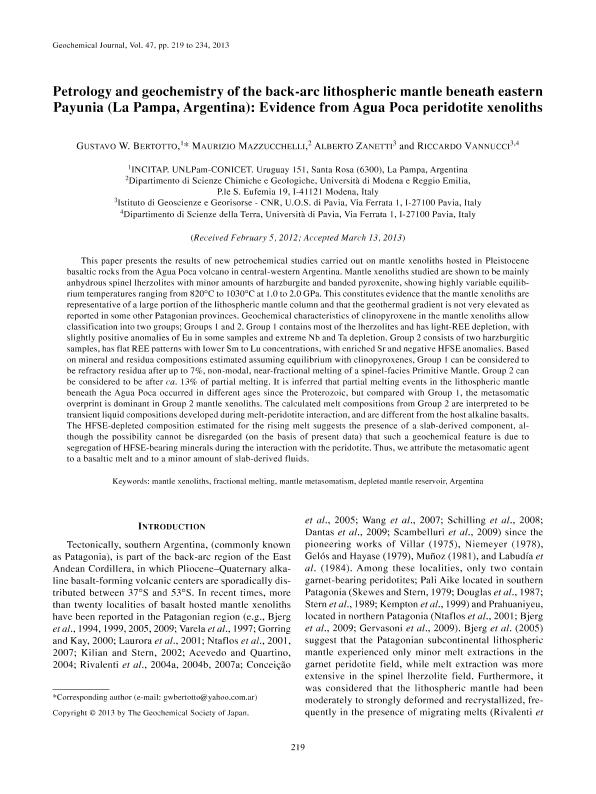Mostrar el registro sencillo del ítem
dc.contributor.author
Bertotto, Gustavo Walter

dc.contributor.author
Mazzucchelli, Maurizio
dc.contributor.author
Zanetti, Alberto
dc.contributor.author
Vannucci, Riccardo
dc.date.available
2017-07-05T17:36:00Z
dc.date.issued
2013-04
dc.identifier.citation
Bertotto, Gustavo Walter; Mazzucchelli, Maurizio; Zanetti, Alberto; Vannucci, Riccardo; Petrology and geochemistry of the back-arc lithospheric mantle beneath eastern Payunia (La Pampa, Argentina): evidence from Agua Poca peridotite xenoliths; Geochemical Society of Japan; Geochemical Journal; 47; 2; 4-2013; 219-234
dc.identifier.issn
0016-7002
dc.identifier.uri
http://hdl.handle.net/11336/19603
dc.description.abstract
This paper presents the results of new petrochemical studies carried out on mantle xenoliths hosted in Pleistocene basaltic rocks from the Agua Poca volcano in central-western Argentina. Mantle xenoliths studied are shown to be mainly anhydrous spinel lherzolites with minor amounts of harzburgite and banded pyroxenite, showing highly variable equilibrium temperatures ranging from 820°C to 1030°C at 1.0 to 2.0 GPa. This constitutes evidence that the mantle xenoliths are representative of a large portion of the lithospheric mantle column and that the geothermal gradient is not very elevated as reported in some other Patagonian provinces. Geochemical characteristics of clinopyroxene in the mantle xenoliths allow classification into two groups; Groups 1 and 2. Group 1 contains most of the lherzolites and has light-REE depletion, with slightly positive anomalies of Eu in some samples and extreme Nb and Ta depletion. Group 2 consists of two harzburgitic samples, has flat REE patterns with lower Sm to Lu concentrations, with enriched Sr and negative HFSE anomalies. Based on mineral and residua compositions estimated assuming equilibrium with clinopyroxenes, Group 1 can be considered to be refractory residua after up to 7%, non-modal, near-fractional melting of a spinel-facies Primitive Mantle. Group 2 can be considered to be after ca. 13% of partial melting. It is inferred that partial melting events in the lithospheric mantle beneath the Agua Poca occurred in different ages since the Proterozoic, but compared with Group 1, the metasomatic overprint is dominant in Group 2 mantle xenoliths. The calculated melt compositions from Group 2 are interpreted to be transient liquid compositions developed during melt-peridotite interaction, and are different from the host alkaline basalts. The HFSE-depleted composition estimated for the rising melt suggests the presence of a slab-derived component, although the possibility cannot be disregarded (on the basis of present data) that such a geochemical feature is due to segregation of HFSE-bearing minerals during the interaction with the peridotite. Thus, we attribute the metasomatic agent to a basaltic melt and to a minor amount of slab-derived fluids.
dc.format
application/pdf
dc.language.iso
eng
dc.publisher
Geochemical Society of Japan
dc.rights
info:eu-repo/semantics/openAccess
dc.rights.uri
https://creativecommons.org/licenses/by-nc-sa/2.5/ar/
dc.subject
Mantle Xenoliths
dc.subject
Fractional Melting
dc.subject
Mantle Metasomatism
dc.subject
Depleted Mantle Reservoir
dc.subject
Argentina
dc.subject.classification
Geología

dc.subject.classification
Ciencias de la Tierra y relacionadas con el Medio Ambiente

dc.subject.classification
CIENCIAS NATURALES Y EXACTAS

dc.title
Petrology and geochemistry of the back-arc lithospheric mantle beneath eastern Payunia (La Pampa, Argentina): evidence from Agua Poca peridotite xenoliths
dc.type
info:eu-repo/semantics/article
dc.type
info:ar-repo/semantics/artículo
dc.type
info:eu-repo/semantics/publishedVersion
dc.date.updated
2017-06-29T13:57:39Z
dc.identifier.eissn
1880-5973
dc.journal.volume
47
dc.journal.number
2
dc.journal.pagination
219-234
dc.journal.pais
Japón

dc.journal.ciudad
Tokio
dc.description.fil
Fil: Bertotto, Gustavo Walter. Consejo Nacional de Investigaciones Científicas y Técnicas. Instituto de Ciencias de la Tierra y Ambientales de La Pampa. Universidad Nacional de La Pampa. Facultad de Ciencias Exactas y Naturales. Instituto de Ciencias de la Tierra y Ambientales de La Pampa; Argentina
dc.description.fil
Fil: Mazzucchelli, Maurizio. Università di Modena e Reggio Emilia. Dipartimento di Scienze Chimiche e Geologiche; Italia
dc.description.fil
Fil: Zanetti, Alberto. Università di Pavia. Istituto di Geoscienze e Georisorse; Italia. Consiglio Nazionale delle Ricerche; Italia
dc.description.fil
Fil: Vannucci, Riccardo. Università di Pavia. Dipartamento di Scienze della Terra; Italia
dc.journal.title
Geochemical Journal

dc.relation.alternativeid
info:eu-repo/semantics/altIdentifier/url/http://www.terrapub.co.jp/journals/GJ/abstract/4702/47020219.html
Archivos asociados
